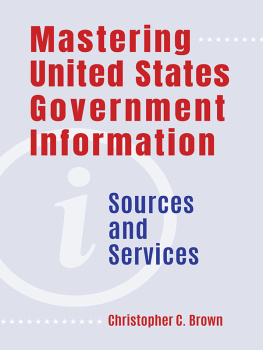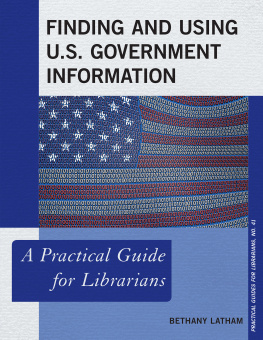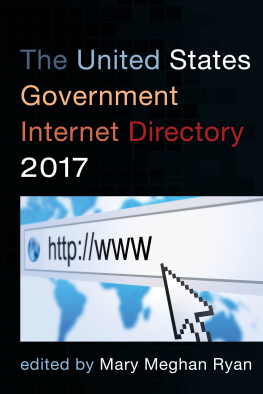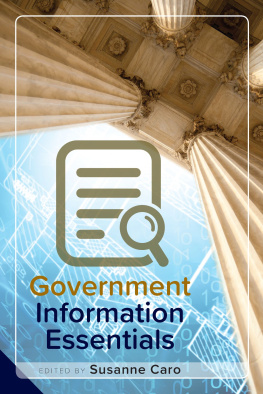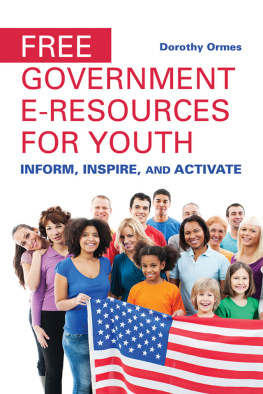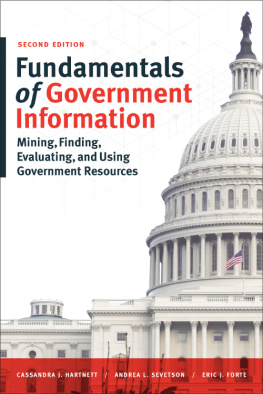Mastering United States
Government Information
Mastering
United States
Government Information
SOURCES AND SERVICES
Christopher C. Brown

Copyright 2020 by Christopher C. Brown
All rights reserved. No part of this publication may be reproduced, stored in a retrieval system, or transmitted, in any form or by any means, electronic, mechanical, photocopying, recording, or otherwise, except for the inclusion of brief quotations in a review, without prior permission in writing from the publisher.
Library of Congress Cataloging-in-Publication Data
Names: Brown, Christopher C., 1953- author.
Title: Mastering United States government information : sources and services / Christopher C. Brown.
Description: Santa Barbara, California : Libraries Unlimited, [2020] | Includes bibliographical references and index.
Identifiers: LCCN 2019059474 (print) | LCCN 2019059475 (ebook) | ISBN 9781440872501 (paperback ; acid-free paper) | ISBN 9781440872518 (ebook)
Subjects: LCSH: Government informationUnited States. | Electronic government informationUnited States. | Government Web sitesUnited States. | Government information agenciesUnited States. | Government publicationsBibliographyMethodology. | Government informationUnited StatesProblems, exercises, etc.
Classification: LCC ZA5055.U6 B76 2020 (print) | LCC ZA5055.U6 (ebook) | DDC 025.17/340973dc23
LC record available at https://lccn.loc.gov/2019059474
LC ebook record available at https://lccn.loc.gov/2019059475
ISBN: 978-1-4408-7250-1 (paperback)
978-1-4408-7251-8 (ebook)
24 23 22 21 20 1 2 3 4 5
This book is also available as an eBook.
Libraries Unlimited
An Imprint of ABC-CLIO, LLC
ABC-CLIO, LLC
147 Castilian Drive
Santa Barbara, California 93117
www.abc-clio.com
This book is printed on acid-free paper 
Manufactured in the United States of America
Contents
I admit it that Im a total government documents nerd. While others are soaking up the latest from Neil Gaiman or rereading Pride and Prejudice for the 20th time, I like nothing better than curling up with a good book born of a deep dive into government documents. The footnotes are just as intriguing as the text, for it is in them that I discover the documents and records that form the basis of the world that we government information librarians know and love.
Chris Browns new text demonstrates that he is a government documents nerd par excellence. Ive been a government documents librarian for 20 years, and like Chris, I teach a class on the subject for the Library and Information Science Program at my university. Reading Mastering United States Government Information: Sources and Services put me on notice that, geek though I may be, there is still a great deal that I dont know about federal government information.
If one needs proof of the value of librarians, it can be found here. Chris previously demonstrated his own mastery of using search engines in his book Harnessing the Power of Google: What Every Researcher Should Know. Now, he shows us how to apply those strategies to locate government information. But the book doesnt stop there. Mastering doesnt just tell you the what; it also explains the why of how government information is organized and made available so the reader can develop a conceptual understanding of the structures and flows of government information.
Chriss long experience as a government documents librarian shows through his intricate explication of the arcane world of the federal government, from regulations and laws to patents and data. He combines a wide variety of source material with his own research findings. Government information changes so rapidly that one cannot hope to adequately describe how to find it using mere lists of resources. Chris knows this and has responded by emphasizing concepts, strategies, and tools.
His passion for helping users find government information is evident on every page. The breadth and depth of his expertise is obvious in the astonishing detail he provides surrounding Congressional publications and the legislative process. While you may not conclude, as did John Godfrey Saxe, that laws, like sausages, cease to inspire respect in proportion as we know how they are made, you will surely respect Masterings demystification of the inner workings of that august body.
Helpful appendixes cover the SuDocs classification scheme, years and sessions of Congress, abbreviations, foreign government domains, correspondence between the U.S. Code and the Code of Federal Regulations, and major databases for federal government information. Abundant illustrations, charts, graphs, and tables will please readers who need to see, as well as read about, relationships and concepts. Exercises reinforce the material presented in each chapter. The final chapter on citing government documents contains numerous examples that will be of use to neophytes and veterans alike.
A host of long-serving government documents librarians have retired in the past decade and have been replaced by new talent. Many of these old-timers (if you will forgive the term) have been able to train their replacements, but for those situations where no direct transfer was possible, Mastering United States Government Information: Sources and Services may represent a sort of brain dump of the collected wisdom of many years in the weeds with federal documents. This volume will turn any librarian into a confident searcher and user of government information. It rightly takes its place beside the classic works of Boyd and Rips, Schmeckebier, Sears and Moody, Morehead, and Hartnett, Sevetson and Forte.
Gwen Sinclair
Chair, Government Documents & Maps Department
University of Hawaii at Mnoa Library
This book is apolitical, and yet it is filled with political themes. The publications of a nation nearly 250 years old contain lofty policies, as well as failed ones. It is hoped that the material contained in these chapters will guide librarians, journalists, researchers, students, and curious citizens through the maze of resources that comprise what we call government information.
I have had a passion for helping others discover government information for most of my library-related life. It all goes back to the first time I learned how to research legislative histories, and I didnt really get it. I took that research seminar three years in a row before I finally understood how to effectively research the background of public laws. My goal since then has been to make it easier for students and researchers to understand the process more quickly than I did. That interest continued when I was hired as a reference librarian at the University of Denver. I was given several choices for area of emphasis. Without blinking, I chose government information. One of the benefits was attending annual and (at that time) semiannual Federal Depository Library Conferences in the Washington, D.C., area and in other parts of the country. Libraries pay a lot of money to maintain depository library collections, so it is a small consolation that the government pays for these conferences. Few conferences are as helpful and informative for the profession.
Finding information from the federal government has never been particularly easy. In the early days of the Republic there was little form or structure, and nobody had access to anything. Today, we have the internet at our fingertips, but the size of government is beyond what anyone can imagine ().

